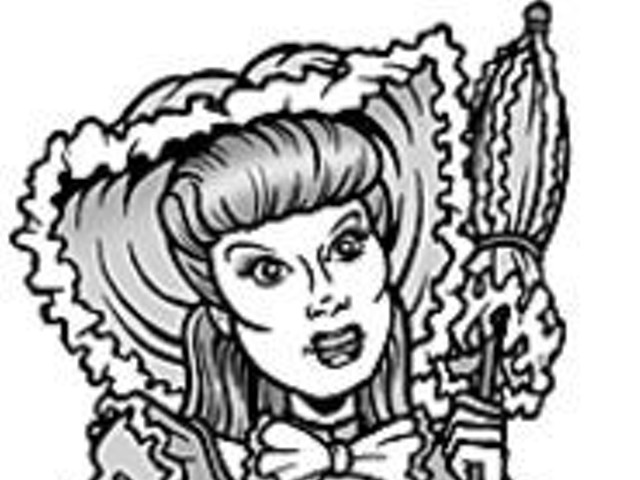The show uses American history as its topic but is really a lesson in the history of comedy. Reaching all the way back to Greek comedy, there are men dressing like women (complete with balloon boobs) and long phallic symbols (also courtesy of balloons). Performers Michael Bowdern, Dave Cooperstein and Blaine Smith also pull from standard clown routines: silly voices, pratfalls, outrageous costumes and, of course, the old pie-in-the-face. The three actors appeared most recently in Speed Racer (directed by Donna Northcott, who also directs Complete History), and the zany shtick of that show seems to have been a warm-up for this one, which also includes speeding cars, superheroes and conspiracy theories. Smith once again performs an amusing Native American dance -- a coincidence? I think not.
The most successful sketches in Complete History rely on vaudeville. Lewis & Clark appear in checkered sport coats as a vaudeville comedy team and rely on punny wordplay and audience interaction. Cooperstein seems completely comfortable in this element, moving effortlessly between onstage sketch and banter with the audience. His sincerity serves him well throughout the show and is a nice contrast to Smith's sarcasm. Bowdern seems occasionally lost, relegated to the thankless role of overplaying all the women's roles and serving as "the dumb one" in the comic trio.
As the show moves chronologically to the age of radio, the humor begins to fizzle. An overly long segment of fictitious radio drama Dodge Rambler, Boy Buckaroo loses steam after the title is announced. It's unclear why the radio performers don costumes, and the rapid segue into a program about a "Super GI" is confusing, while the jokes are simply tasteless. The performers and audience had much more fun with a spoof of the television show Queen for a Day. Cooperstein worked the audience with great comic timing, asking questions about famous historical women and offering as a prize one of the "Great American Women" playing cards ("Collect all three!").
Less successful is the political humor, which, more than any other kind of humor, is topical: It lives today and won't be funny tomorrow. Northcott, with her vast Shakespeare experience, should know this better than most. Much of what is usually cut in a modern production of Shakespeare is the topical political humor. And even though Complete History is recently published, segments of it are already outdated. The Ron-and-Nancy ventriloquist sketch seems simply tacky in light of Ron's recent death. And is a joke about John Hinckley ever funny? Some pruning would have helped tremendously.
Complete History redeems itself in its final moments, when Bowdern, Cooperstein and Smith (who apparently never run out of energy) perform a synchronized kick-line backwards through history, undoing all the terrible things that have happened through time. Their Chorus Line satire is a tribute to American optimism and trades in groan-inducing puns for good old-fashioned song and dance, complete with twinkling lights. It's an uneven evening of comic silliness, with midget jokes and the theme song from Gilligan's Island. If you're looking for drama with characters and plot, wait for the rest of the St. Louis Shakespeare season. If you don't mind wading through some bad jokes in search of the good, wear your rain gear and arrive early for the best seats.





